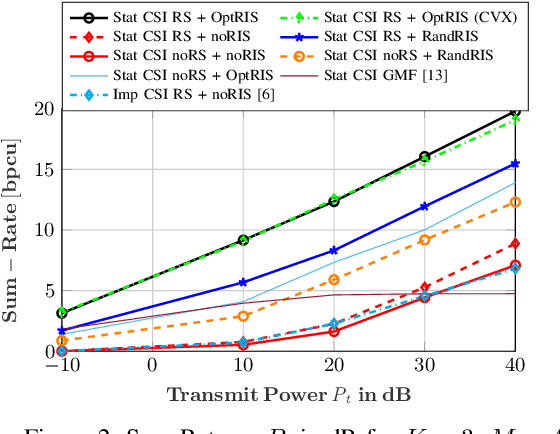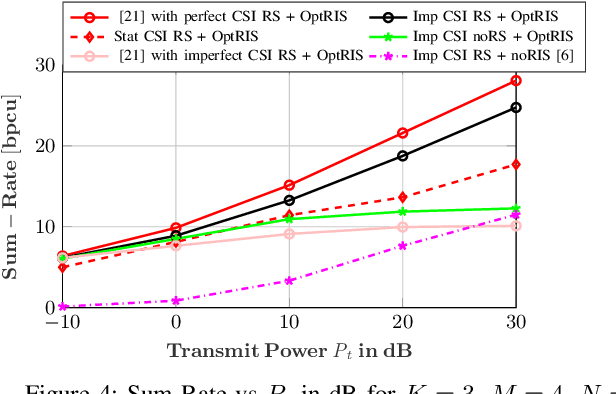Sadaf Syed
On the Optimality of Rate Balancing for Max-Min Fair Multicasting
Jan 29, 2026Abstract:The max-min fair (MMF) multicasting problem is known to be NP-hard. In this work, we analytically derive the optimal solution to this NP-hard problem and establish the equivalence between rate balancing and the optimal MMF multicasting solution under certain conditions. Based on this theoretical insight, we propose a low-complexity algorithm for MMF multicasting that yields closed-form solutions. Simulation results validate our analysis and demonstrate that the proposed algorithm outperforms the state-of-the-art methods while being computationally more efficient.
Sum-Rate Optimisation of a Multi-User STAR-RIS-Aided System with Low Complexity
Apr 28, 2025Abstract:Reconfigurable intelligent surface (RIS) is a promising technology for future wireless communication systems. However, the conventional RIS can only reflect the incident signal. Hence, it provides a limited coverage, as compared to a simultaneously transmitting and reflecting RIS (STAR-RIS). Prior works on the STAR-RIS address the power minimisation or the sum-rate maximisation problem by reformulating the objective problem as a convex optimisation problem and then employing numerical tools like CVX to obtain the solution, which introduces significant computational complexity leading to a huge runtime, making the algorithms impractical for real-world implementation. In this paper, we propose a low complexity solution for the optimisation of a multi-user STAR-RIS system, where the non-convex optimisation problem is decomposed into multiple convex sub-problems with closed-form optimal solutions. The simulation results illustrate that our proposed algorithm achieves similar performance to CVX-based solutions in the literature while being computationally efficient.
Sparse Bayesian Generative Modeling for Compressive Sensing
Nov 14, 2024Abstract:This work addresses the fundamental linear inverse problem in compressive sensing (CS) by introducing a new type of regularizing generative prior. Our proposed method utilizes ideas from classical dictionary-based CS and, in particular, sparse Bayesian learning (SBL), to integrate a strong regularization towards sparse solutions. At the same time, by leveraging the notion of conditional Gaussianity, it also incorporates the adaptability from generative models to training data. However, unlike most state-of-the-art generative models, it is able to learn from a few compressed and noisy data samples and requires no optimization algorithm for solving the inverse problem. Additionally, similar to Dirichlet prior networks, our model parameterizes a conjugate prior enabling its application for uncertainty quantification. We support our approach theoretically through the concept of variational inference and validate it empirically using different types of compressible signals.
Bilinear Precoder Based Efficient Rate Splitting Method in FDD Systems
Nov 04, 2024Abstract:In this work, we propose a low-cost rate splitting (RS) technique for a multi-user multiple-input single-output (MISO) system operating in frequency division duplex (FDD) mode. The proposed iterative optimisation algorithm only depends on the second-order statistical channel knowledge and the pilot training matrix. Additionally, it offers a closed-form solution in each update step. This reduces the design complexity of the system drastically as we only need to optimise the precoding filters in every coherence interval of the covariance matrices, instead of doing that in every channel state information (CSI) coherence interval. Moreover, since the algorithm is based on closed-form solutions, there is no need for interior point solvers like CVX, which are typically required in most state-of-the-art techniques.
Low Complexity Rate Splitting Approach in RIS-Aided Systems Based on Channel Statistics
Oct 16, 2024



Abstract:Rate splitting multiple access (RSMA) and reconfigurable intelligent surface (RIS) are two prospective technologies for improving the spectral and energy efficiency in future wireless communication systems. In this work, we investigate a rate splitting (RS) technique for an RIS-aided system in the presence of only statistical channel knowledge. We propose an algorithm with a quasi closed-form solution based only on the second-order channel statistics, which reduces the design complexity of the system as it does not require estimation of the channel state information (CSI) and optimisation of the precoding filters and phase shifts of the RIS in every channel coherence interval.
Design of a Multi-User RIS-Aided System with Statistical Channel Knowledge
May 14, 2024



Abstract:Reconfigurable intelligent surface (RIS) is a promising technology to enhance the spectral and energy efficiency in a wireless communication system. The design of the phase shifts of an RIS in every channel coherence interval demands a huge training overhead, making its deployment practically infeasible. The design complexity can be significantly reduced by exploiting the second-order statistics of the channels. This paper is the extension of our previous work to the design of an RIS for the multi-user setup, where we employ maximisation of the lower bound of the achievable sum-rate of the users. Unlike for the single-user case, obtaining a closed-form expression for the update of the filters and phase shifts is more challenging in the multi-user case. We resort to the fractional programming (FP) approach and the non-convex block coordinate descent (BCD) method to solve the optimisation problem. As the phase shifts of the RIS obtained by the proposed algorithms are based on the statistical channel knowledge, they do not need to be updated in every channel coherence interval.
Design of a Single-User RIS-Aided MISO System Based on Statistical Channel Knowledge
Sep 08, 2023Abstract:Reconfigurable intelligent surface (RIS) is considered a prospective technology for beyond fifth-generation (5G) networks to improve the spectral and energy efficiency at a low cost. Prior works on the RIS mainly rely on perfect channel state information (CSI), which imposes a huge computational complexity. This work considers a single-user RIS-assisted communication system, where the second-order statistical knowledge of the channels is exploited to reduce the training overhead. We present algorithms that do not require estimation of the CSI and reconfiguration of the RIS in every channel coherence interval, which constitutes one of the most critical practical issues in an RIS-aided system.
 Add to Chrome
Add to Chrome Add to Firefox
Add to Firefox Add to Edge
Add to Edge